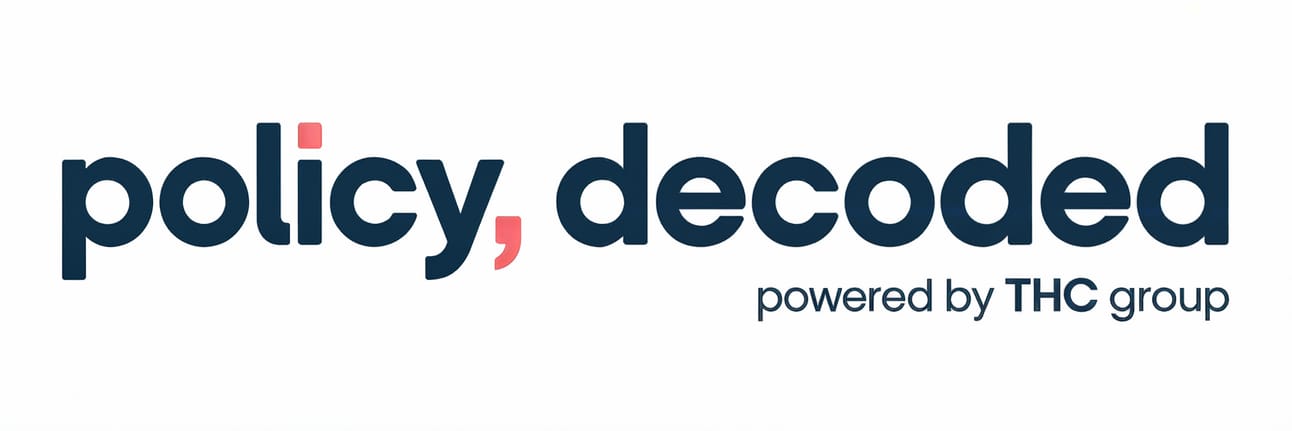Built by a former cannabis regulator, Policy, Decoded is your no-fluff, high-signal daily briefing for operators, investors, and policymakers navigating the collision of politics, law, and commerce.
Liability just got real. A New Jersey court confirmed what too many in this industry have pretended wasn’t true: product liability applies here. If you sell it, you own it.
Nebraska’s racing toward a July 1 medical launch with a flower ban, potency limits, and a regulatory posture that’s designed for risk aversion, not patient access. Meanwhile, California bets $30 million on cannabis research. The fight over legalization tax revenue is heating up again.
And a quick pause to note the passing of Bill Downing, a Massachusetts cannabis pioneer who fought harder and longer than most of us. His work made this possible.
The map’s still moving. Pay attention. Move smarter.

Start here — the day’s most important development, decoded for impact.
📌 What Happened:
Nebraska’s Medical Cannabis Commission has approved emergency regulations for the state’s voter-approved medical cannabis program. The rules ban smokable flower, pre-rolls, and inhalable plant material outright. Edibles face strict potency caps. The package includes mandatory warning labels, advertising restrictions, and narrow product categories (Nebraska Public Media, Marijuana Moment).
This comes as the state faces a July 1 deadline to launch the program. On the same day, a Lancaster County judge dismissed a lawsuit that tried to dismantle the ballot initiative process itself, clearing the final legal roadblock between the program and implementation (KLKN).
💡 Why It Matters:
Legalization wins elections. The regulations decides what that actually means. Nebraska’s medical program shows exactly how that plays out when the statute is restrictive and the regulatory posture matches it.
Banning flower sends a clear signal. This market will operate under a pharmaceutical framework. Potency limits, packaging constraints, limited form factors - each lever is designed to reinforce control. Compliance drives the structure, not patient access.
This is where the tension locks in. Restrictive statutes limit the ability of regulators to adapt quickly. But a regulator inclined to write conservative rules doesn’t look for flexibility anyway. Nebraska’s rule set reflects alignment, not conflict, between the agency and the legislature.
🧠 THC Group Take: This is the architecture of cannabis in politically cautious states. Voters clear the political hurdle. Regulators and lawmakers design the smallest possible box to contain it.
Operators watching Nebraska should understand the model on display. This is a compliance-driven framework designed to neutralize political risk. It prioritizes minimal exposure over market viability.
A system this tight creates risk of a different kind. The gap between what voters approve and what patients experience eventually generates pressure. Sometimes that pressure reshapes laws. Sometimes it builds until the next ballot measure forces the issue again.
Nebraska is writing the next chapter in that pattern. The rulebook is the policy. And that policy is now fully visible.

Fast-moving headlines, flagged for what matters.
Nebraska’s Medical Cannabis Commission has approved emergency rules banning smokable flower for patients, including raw flower, pre-rolls, and anything close to it (Marijuana Moment). The rules drop ahead of a legalization vote that doesn’t exist yet, as regulators try to stand up a medical framework from scratch. Nebraska isn’t building a dispensary-driven market. This is a pharmaceutical model with tight controls, narrow product categories, and zero political appetite for anything that looks like adult-use retail.
Rep. Andy Harris (R-MD), the architect behind the Farm Bill’s proposed federal hemp THC ban, says he’s “not worried” about Senate opposition (Marijuana Moment). Harris insists the amendment is a necessary fix to close what he calls an unintended loophole. The posture from House leadership remains clear - full prohibition on intoxicating hemp stays in the bill until someone forces it out. The fight over hemp’s identity heads straight for the Senate floor. Do you know your Senator? Have you called their office?
California’s new budget includes $30 million to fund cannabis industry research, with a focus on public health, environmental impacts, market dynamics, and regulation (North Bay Business Journal). The move signals that California intends to treat cannabis as a serious subject of scientific and economic study, not just a tax source. Expect new data to shape future policy battles over sustainability, health, and industry oversight.
Hemp operators in Arizona have filed a lawsuit to block the state from regulating hemp-derived THC under marijuana rules (Courthouse News). The complaint argues that the state’s Department of Health exceeded its authority by imposing cannabis-style licensing and compliance requirements on hemp products. This case is another front in the national fight over where hemp ends and marijuana begins, and who gets to draw that line.
A new proposal in California would redirect a portion of cannabis tax revenue toward child welfare and youth programs, rather than the industry’s long-promised funding for cannabis equity and community reinvestment (Silicon Valley). Industry groups are pushing back, calling it a bait and switch that undermines the original social justice commitments baked into legalization. The fight over how cannabis revenue gets spent is back on the table.
As hemp-derived and THC beverages hit the mainstream, hospitality venues face fresh liability risks, and serious compliance headaches (BevInfo Group). Over-serving, ID checks, impairment management, and insurance coverage all get more complicated when cannabis drinks share the menu with alcohol. The legal gray zone is closing fast, but the risk isn’t.

The deeper pattern behind today’s moves — and why it matters next.

